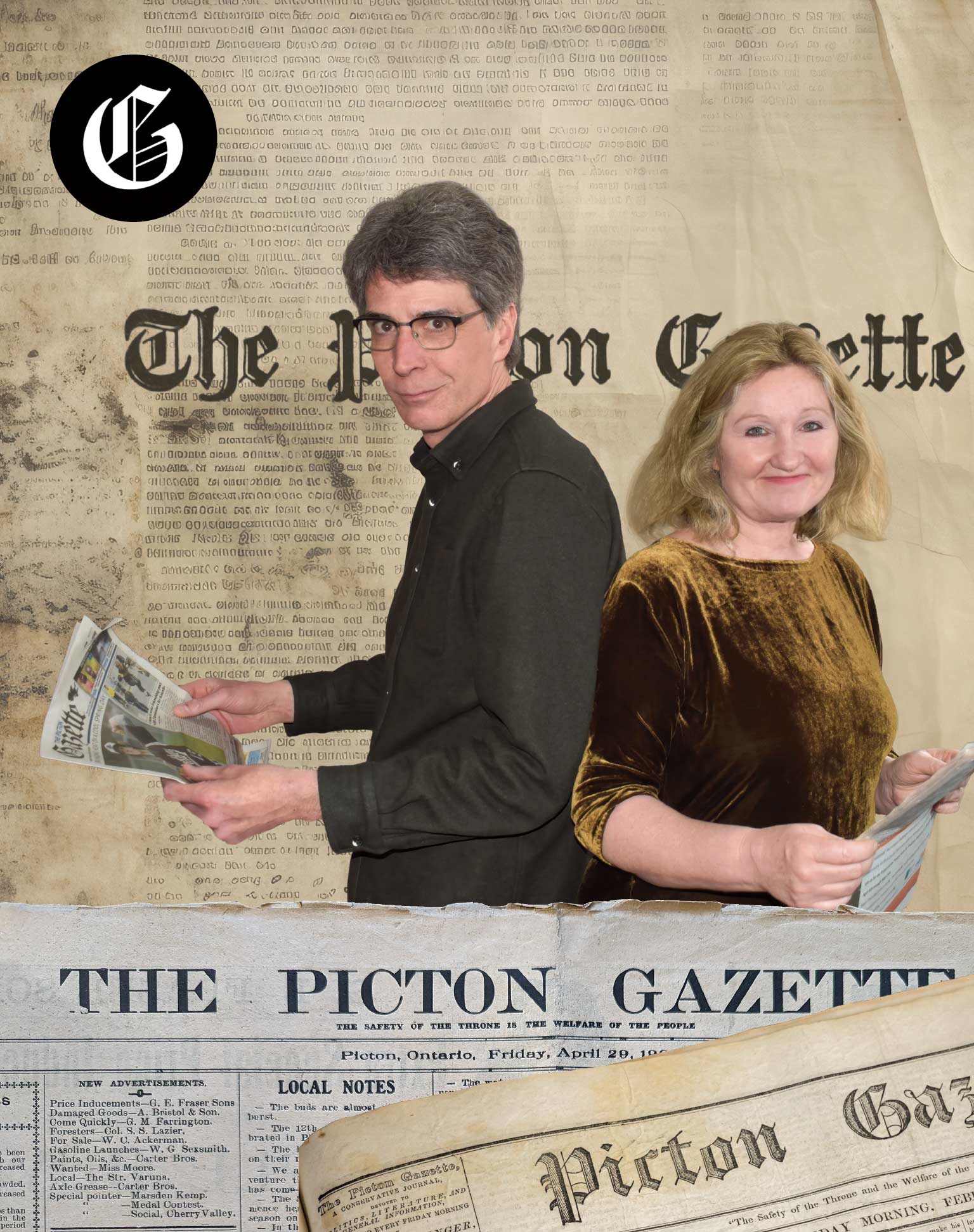
In an era when communities need small town newspapers more than ever, the Picton Gazette is keeping the presses rolling.
A good newspaper, American playwright Arthur Miller once said, is a nation talking to itself. By that standard – and Miller’s observation is true, by the way – the Picton Gazette is indeed a good newspaper. It talks by, for and about the community in which it has long been based. It doesn’t talk to itself, so much as it facilitates a good conversation.
And mostly, it is a bit of the soul of Prince Edward County. It calls itself the County’s newspaper of record, and that sounds right.
The record of Prince Edward County has been dutifully maintained in its pages, for not just years, but just about two centuries. It is the oldest weekly newspaper in Canada, which is no small thing in an era of failing media and shrinking news holes.
It made its debut in 1830, as the Hallowell Free Press, in what was then known as Upper Canada. Hallowell was the northwest side of Picton Bay, named after a Loyalist settler from Massachusetts, so the paper took its name from that. It was rechristened the Picton Gazette a few years later, in 1836.
Fast forward 188 years: Christopher Fanning, one of the two new owners of the paper, looks over a leather-bound volume of the Hallowell Free Press. He is lean and bespectacled, and his voice is filled with reverence.
He points a finger at one of the old pages, which are filled with tight script, and which smell a bit of dust and time. He smiles, pointing to the poetry on the first page, and the serialized short stories, and the many ads for snake-oil remedies. There’s even this news story from June 1, 1860: LINCOLN NOMINATED FOR U.S. PRESIDENCY, it reads.
“They had notices about runaway apprentices back then,” he says, pointing to one 1831 notice in the Hallowell Free Press. “Lots of notices about runaway wives, too!”
A student of language and history, Christopher is a professor of English at Queen’s, with focus on precisely the period in which the Picton Gazette, née Hallowell Free Press, came into being. You can see that he loves this late-career change. Listening to him – and listening to his wife and co-owner Karen Valihora, who arrives a few minutes later – one is moved to ask them:
What were you thinking? About getting into the newspaper business, that is. Both university English professors (he Queen’s, she York), both earning stable incomes and with a happy life. Otherwise sane, happy people, getting into the newspaper business in 2024? Hello?
In the early days of the paper, it probably made sense. You could make a lot of money owning and running a newspaper. These days, not so much. The grim statistics are ubiquitous and depressing: between 2019 and 2022, the U.S. saw two newspapers dying every single week. South of the border, a third of all newspapers are expected to be gone by next year.
Up here in the former Upper Canada, the statistics are just as bad, or worse: Nearly 300 news outlets gone since 2008 – 231 of them being newspapers in 180 communities across the country. Most of those were community papers, like the Picton Gazette. So, again, what were Karen Valihora and Christopher Fanning thinking? Did they take leave of their senses?
Karen smiles. (She smiles a lot.) She is the candid, plain-spoken part of the operation. Karen readily acknowledges that the newspaper business is a very risky one these days. But it is evident that she loves it without condition. Her husband does, too.
Says Karen: “We had been reading the paper for a couple of years – we had a cottage here. We lived here part of the time, since 2017. We had bought a beautiful old farmhouse. We were in this stunning area, and we were here part-time, and then the pandemic hit. And we quickly saw that the paper was a crucial part of the community. It was in fact how we got to know the community. We pored over every paper. Every week, Chris and I read it, cover to cover.
“And we noticed that everyone was reading it, too. It was the County’s paper.”
They noticed a For Sale sign in the Gazette’s window, then located farther along Main Street. Around the same time, some of the paper’s yellowed distribution boxes started to disappear.
Since 1977, the Gazette had been owned and run by Earl and Jean Morrison and their children. But by the early part of this decade, it was starting to show its age. Christopher and Karen feared that the paper would die, like so many papers have done in recent years. So they decided to buy it.
Again, and with the greatest of respect, had they lost their minds?
“It was naïve. Like, there is no doubt,” Karen laughs. She is the one with some actual newspaper experience – back in her student days, she helped to run the (usually wildly radical) McGill Daily. She has re-taken to journalism with enthusiasm and aplomb.
Christopher nods about the dangers of owning a newspaper these days. “Seeing [newspapers] diminish is so deeply concerning. But as Karen was saying, it’s also about the Picton Gazette in particular: we saw that people would talk about what was in the newspaper, or they would check the newspaper to see what was going on in the community. And that was something that was very, very attractive to me.”
And, so, they are making a go of it. They still teach. They’ve got five kids, three of whom go to Prince Edward Collegiate Institute. They live in Cressy, and – despite what some may have predicted, and what they themselves wondered – they have kept the Picton Gazette a going concern, and then some. In fact, they have rendered the paper a success in an era where the words “newspaper” and “success” aren’t used together in a sentence so much anymore.
When they bought it, the Picton Gazette’s bottom line had been largely neglected for a decade. Ad revenue was barely keeping the lights on. The publisher, Jean Morrison, had died years before. Her adult children did their best, but things looked a bit grim at the start.
Says Karen: “We raised our ad rates a bit, and that’s been helpful. That’s the bread and butter for a local paper. But most of the cost is in printing.”
Their printer is located in Montreal. They pull in around $10,000 a week in ad sales, which both say “is pretty robust,” but about $6,000 of that amount goes into printing costs. The Gazette is a year-round enterprise, so ad sales go up a bit in the summertime. But neither Christopher nor Karen have been paid anything since they started. They seem okay with that. For now.
They’ve done a beautiful redesign of the paper and the website, relying upon the talents of local designer Jed Tallo. And – in a big step – they moved distribution away from the old methodology (papers flung out of truck windows, often completely missing the right address) and to something new (direct Canada Post mailbox delivery). They’ve heard some kvetching about the mailbox change, yes, but it made sense for many reasons, both say.
“Distributing the paper was $2,000 a week for a crew of people to toss the newspapers just about everywhere,” says Karen. “But Canada Post is charging us the same amount. So it was actually a really good decision. Canada Post guarantees delivery, and now we can tell advertisers that there are 14,327 people actually getting the paper – and that circulation is found in 15,000 places. It now goes to every mailbox, residential and commercial location across the County.”
Also rare for newspapers these days: Karen and Christopher have maintained a staff of reporters and editors, some full-time, some part-time. And, in the view of most, the quality of the writing they do – and the number of stories they conjure up – has decidedly improved under the new management. In a community that clearly values community-based journalism (as seen in the pages of the Wellington Times, and in the magazine you now grasp in your hands), that matters. A lot.
So, what does the future hold?
Karen smiles again. “It’s exhausting”, she says, writing stories, chasing ads. “But it’s actually been a joy. You know: like really, really great.”
Christopher again nods in agreement, and his voice fills with what sounds like delight: “This is the oldest paper in Canada,” he says pointing at the walls of their new office at 100 Main Street. “This newspaper has a heritage. It’s an archive, it’s a heritage worth preserving. There were many reasons to take it on. And we’re so glad we did.” Us too.
Story by:
Warren Kinsella
Photography by:
Jason Parks



